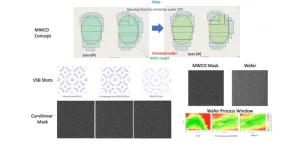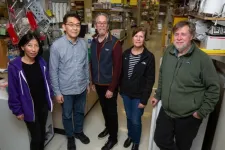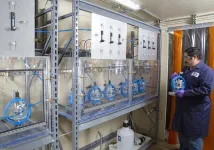(Press-News.org) Dr. Mustafa Akbulut, professor of chemical engineering, has teamed up with horticultural science professor Luis Cisneros-Zevallos to engineer longer-lasting, bacteria-free produce.
According to Akbulut’s recent publication in Current Research in Food Science, the global fruit and vegetable market loses over 50% of agricultural fruit production during various stages of produce handling and post-harvest treatments.
Many fruits and vegetables already have a layer of food-grade wax that is applied for cosmetic reasons and to prevent water loss. Akbulut’s research combines such wax with nano-encapsulated cinnamon-bark essential oil in protein carriers to enhance them with antibacterial properties.
“We are living in an age where technology has advanced so much,” Akbulut said. “However, the food industry has not competed with these advances, and there are continuous problems with food safety. News about foodborne diseases and outbreaks reporting hundreds of people becoming sick from unhygienic food frequently appears at the national level.”
Akbulut’s wax coating technology bolsters the safety of fresh produce and provides enhanced protection against bacteria and fungi. This composite coating provides both immediate and delayed antibacterial effects, according to the article.
Foodborne pathogens are especially problematic for fruits and vegetables that are consumed raw or minimally processed due to the lack of high temperatures that can inactivate them.
Development of this coating gives better understanding of the interactions between the wax and undesired microorganisms, Cisneros-Zevallos said.
Potential Industry Use
“I think that the impact that these wax coatings will have on the industry is very big because the industry is looking for new technologies,” Cisneros-Zevallos said. “This is one of those tools that we are developing that could actually help the industry face these challenges against human pathogens and spoilage organisms.”
Nano-encapsulated essential oil makes it harder for bacteria to attach and survive on fruits or vegetables. The delayed release of the essential oil increases the half-life of active ingredients and produce compared to its unencapsulated counterparts, according to the article.
“When bacteria are exposed to essential oil it can break down the bacterial wall,” Akbulut said. “This technology is going to basically help us inactivate the bacteria and fungi to extend the shelf life.”
Doctoral student Yashwanth Arcot ran experiments to support the research.
“This coating was also inhibiting the fungal attachment,” Arcot said. “We have tested this system against Aspergillus, a fungus responsible for the spoilage of food commodities and the onset of lung infections in humans. We were successful in preventing its growth on the hybrid coatings.”
Arcot said this is the first development of hybrid technologies for killing bacteria and fungus using nano-encapsulated essential oil in food waxes.
The chemicals used to produce this hybrid wax are antibacterial agents that are FDA-approved.
“These hybrid wax coatings are easily scalable and can be implemented in food processing industries,” Arcot said.
Additional contributors to the research include Dr. Matthew Taylor from Department of Food Science and Technology, Dr. Younjin Min from the University of California, Riverside, and Dr. Alejandro Castillo from the Department of Food Science and Technology.
This research received partial funding through the Food Manufacturing Technologies Program provided by the United States Department of Agriculture (USDA). Additionally, funding comes from the USDA National Institute of Food and Agriculture - Specialty Crop Research Initiative.
By Raven Wuebker, Texas A&M Engineering
###
END
Engineering a coating for disease-free produce
2024-02-21
ELSE PRESS RELEASES FROM THIS DATE:
Ochsner Children’s Hospital advocates to close the gap in pediatric heart care
2024-02-21
NEW ORLEANS, LA - Ochsner Children's Hospital, ranked among the top hospitals in the nation for pediatric cardiology and congenital heart surgery, is raising awareness of the need for more pediatric-specific heart devices. As the only pediatric heart transplant program in Louisiana and the only program in the state to offer advanced mechanical support options for pediatric cardiology patients, Ochsner Children’s Hospital is committed to advocating for additional medical devices to enhance its high-quality care to pediatric patients ...
Cobalt-free electrodes achieved with nickel ions
2024-02-20
Many electric vehicles are powered by lithium-ion batteries that rely on cobalt — a scarce, expensive metal with high environmental and social costs. A team of researchers from Japanese and French universities have now developed a practical nickel-based electrode material that opens new avenues to cobalt-free batteries for electric vehicles.
The researchers detailed their findings in a study published on Jan. 15 in the journal Energy Storage Materials.
“There is an undeniable need for cobalt-free, high-energy electrode materials for lithium-ion ...
Throwing lithography a curve
2024-02-20
At the heart of advancing semiconductor chip technology lies a critical challenge: creating smaller, more efficient electronic components. This challenge is particularly evident in the field of lithography, the process used to create intricate patterns on semiconductor materials (called wafers) for the production of chips. Lithography uses a kind of template, called a photomask — or just mask — for creating patterns on semiconductor wafers. The industry is always looking for methods that improve resolution and manufacturability for both masks and ...
St. Jude taps health care start-up veteran as first Senior Vice President of Tech Commercialization
2024-02-20
(MEMPHIS, Tenn., February 20, 2024) St. Jude Children’s Research Hospital has appointed Lisa Jordan, MS, MBA, as the institution’s first-ever Senior Vice President of Technology Commercialization to lead industry partnerships and the commercialization of innovations. Jordan will work with researchers to bring a greater number of new technologies, innovations and scientific breakthroughs to the clinic, enabling breakthroughs from St. Jude laboratories to benefit more patients.
The move, part of the institution’s 2022-2027 ...
Microplastics in every human placenta, new UNM Health Sciences research discovers
2024-02-20
A flurry of recent studies has found that microplastics are present in virtually everything we consume, from bottled water to meat and plant-based food. Now, University of New Mexico Health Sciences researchers have used a new analytical tool to measure the microplastics present in human placentas.
In a study published February 17 in the journal Toxicological Sciences, a team led by Matthew Campen, PhD, Regents’ Professor in the UNM Department of Pharmaceutical Sciences, reported finding microplastics in all 62 of the placenta samples tested, with concentrations ranging from 6.5 to 790 micrograms ...
Examining a century of change in a New York City urban forest
2024-02-20
There haven’t been many long-term studies on urban forests, but data collected from the Thain Family Forest, which the New York Botanical Garden (NYBG) has been stewarding for more than a century, has provided an opportunity for scientists from The Forest School at YSE to study a century of changes of its composition.
Using inventory data from 1937-2021, Eliot Nagele ’21 MF, who initiated the research while a forester at Thain and a student at YSE, documented changes in forest structure, diversity, and composition to assess the health of the forest over time. ...
Salk scientists discover new target for reversible, non-hormonal male birth control
2024-02-20
LA JOLLA (February 20, 2024)—Surveys show most men in the United States are interested in using male contraceptives, yet their options remain limited to unreliable condoms or invasive vasectomies. Recent attempts to develop drugs that block sperm production, maturation, or fertilization have had limited success, providing incomplete protection or severe side effects. New approaches to male contraception are needed, but because sperm development is so complex, researchers have struggled to identify parts of the process that can be safely and effectively tinkered ...
Unlike men, for professional women, having high-status connections can backfire
2024-02-20
Women working in organizations are frequently encouraged to cultivate connections to high-status individuals based on a prominent social network theory. But new research conducted in China and the United States suggests that having high-status connections can backfire for women.
The study, by researchers at Carnegie Mellon University and the University of Michigan, appears in Organizational Science.
“Our findings reveal a social-network dilemma for women that is contrary to a widely accepted belief that women should build their network with high-status individuals,” said Catherine Shea, Assistant Professor of Organizational Behavior and Theory at Carnegie Mellon's Tepper School ...
Time watching videos may stunt toddler language development, but it depends on why they're watching
2024-02-20
DALLAS (SMU) – A new study from SMU psychologist Sarah Kucker and colleagues reveals that passive video use among toddlers can negatively affect language development, but their caregiver’s motivations for exposing them to digital media could also lessen the impact.
Results show that children between the ages of 17 and 30 months spend an average of nearly two hours per day watching videos – a 100 percent increase from prior estimates gathered before the COVID pandemic. The research reveals a negative association between high levels of digital media watching and children’s vocabulary development.
Children exposed to videos ...
SwRI to host second Automotive Corrosion Symposium
2024-02-20
SAN ANTONIO — February 20, 2024 —Southwest Research Institute will host its second Automotive Corrosion Symposium in Detroit April 11-12. The event, first held in 2022, is designed to foster communication among corrosion experts from within automotive original equipment manufacturers (OEMs) as well as material, paint and other automotive suppliers over a wide spectrum of industry-identified corrosion issues.
“Corrosion is a concern within the automotive industry, not just for cosmetic reasons, but because it can affect functionality and safety,” said SwRI Staff Engineer James Dante, one of the organizers ...







